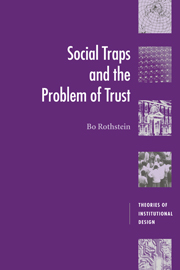Book contents
- Frontmatter
- Contents
- List of tables and figures
- Acknowledgements
- 1 Reflections after a long day in Moscow
- 2 On the rational choice of culture
- 3 On the theory and practice of social capital
- 4 Social capital in the social democratic welfare state
- 5 How is social capital produced?
- 6 The problem of institutional credibility
- 7 Trust and collective memories
- 8 The transition from mistrust to trust
- 9 The conditions of trust and the capacity for dialog
- Bibliography
- Index
6 - The problem of institutional credibility
Published online by Cambridge University Press: 22 September 2009
- Frontmatter
- Contents
- List of tables and figures
- Acknowledgements
- 1 Reflections after a long day in Moscow
- 2 On the rational choice of culture
- 3 On the theory and practice of social capital
- 4 Social capital in the social democratic welfare state
- 5 How is social capital produced?
- 6 The problem of institutional credibility
- 7 Trust and collective memories
- 8 The transition from mistrust to trust
- 9 The conditions of trust and the capacity for dialog
- Bibliography
- Index
Summary
We can conclude from chapter 5 that variations in the supply of social capital in a society are rooted mainly in the design of political and administrative institutions. The causal factor seems to be the degree of universalism in those institutions, understood as impartiality, objectivity, and equal treatment. We also presented a theory that specifies how the causal mechanism (or mechanisms) is constructed as a link between state institutions and individual worldviews and which produce – or destroy – social capital. The connection between how political institutions are constructed and the belief systems of the people is central here, as it implies that the design of political institutions should not be regarded solely as an effect of a society's historical and cultural legacy. On the contrary, it is possible to show, in Swedish political history, for example, that highly deliberate choices have been made by key politicians in the construction of political institutions with the express purpose of influencing the belief systems of the people. This applies, for instance, to the design of the pension system in 1912, to the choice between general and selective social insurance programs during the 1940s; and to the design of unemployment insurance in the 1930s (Olsson 1993; Rothstein 1992c, 1998a; Svensson 1994).
As shown by Hilton Root's studies of societies such as Hong Kong and Singapore (Root 1996), for example, institutional design is not culturally determined.
- Type
- Chapter
- Information
- Social Traps and the Problem of Trust , pp. 129 - 147Publisher: Cambridge University PressPrint publication year: 2005



